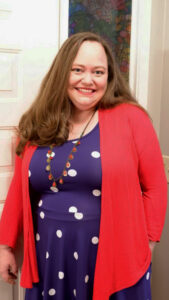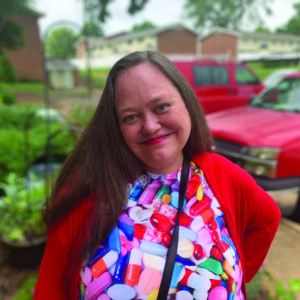 Amanda Crowell Itliong
Amanda Crowell Itliong
When I was first diagnosed with borderline and then low-grade ovarian cancer, I went to the Stanford medical library and found that there was nothing exactly relevant to read about what was going on in my body. Luckily, I’ve lived long enough to see that change. I’ve even been able to be part of the science.
Cancer means a lot of unwanted, scary, and at times, secret changes. I went from being an expert and a success story in my beloved career in leadership and service to “just a patient with disability.” The seemingly unshakeable friendships disappeared. “In sickness and in health” does not always apply to the reality of cancer. As such, a divorce becomes a nasty little secret that cancer patients often keep to themselves.
Most people who have known me my whole life would characterize me as “intense.” I call myself a recovering overachiever perfectionist. However, facing life and death issues can bring on a different level of intensity. There is an urgency associated with being a cancer peer, advocate, researcher, and healthcare advocate. After 13 years since my first diagnosis, 3 recurrences, 9 years of active treatment, 6 surgeries, more treatments than I care to count anymore, 2 clinical trials, and receiving care in 6 major hospitals, I carry my story forward and represent so many who have died before me. Those personal stories are with me in my heart and often on my tongue every single day, fueling the work I do. I hope some of you will carry my story and share what I would have wanted or needed when I am dead too.
 Twice my life shifted to death mode when I was told by the most talented and caring oncologists that there were no treatment options left for me. Both times I found a hopeful clinical trial where my participation would help science and future patients. I thought that perhaps they would change my life too. They did, although sometimes not in the way I had anticipated. The first trial meant open bleeding wounds on my face that I had to peel off my pillow every morning. Movies would make you believe cancer means being skinny and bald. The reality is that you can gain weight or look like an extra from The Walking Dead. No one is ever ready for this. I haven’t looked like myself in almost 15 years. The current clinical trial out of state has brought more changes, in me having to fight for reimbursement of “reasonable” expenses, like the Ohio turnpike toll. Having to argue about the “reasonability” of expenditures with people who never met any clinical trial participant sick enough to even qualify for it is a brutal experience. This unwanted expertise makes me want to not just change the healthcare system but rebuild it from scratch. The new design would create a partnership between the patients who have not had a voice before and the incredible healthcare workers who have novel ideas for the future state, centered on “care.”
Twice my life shifted to death mode when I was told by the most talented and caring oncologists that there were no treatment options left for me. Both times I found a hopeful clinical trial where my participation would help science and future patients. I thought that perhaps they would change my life too. They did, although sometimes not in the way I had anticipated. The first trial meant open bleeding wounds on my face that I had to peel off my pillow every morning. Movies would make you believe cancer means being skinny and bald. The reality is that you can gain weight or look like an extra from The Walking Dead. No one is ever ready for this. I haven’t looked like myself in almost 15 years. The current clinical trial out of state has brought more changes, in me having to fight for reimbursement of “reasonable” expenses, like the Ohio turnpike toll. Having to argue about the “reasonability” of expenditures with people who never met any clinical trial participant sick enough to even qualify for it is a brutal experience. This unwanted expertise makes me want to not just change the healthcare system but rebuild it from scratch. The new design would create a partnership between the patients who have not had a voice before and the incredible healthcare workers who have novel ideas for the future state, centered on “care.”
A step in the right direction is MOQC’s focus on the Patient Reported Outcomes (PROs). It is an opportunity to make some exciting changes in how physicians and patients work together. I would like to see the initiative enable us to become more flexible and more responsive to the patient’s concerns and needs. One of my biggest worries as a patient often with different, complicated issues, is making sure my priorities are heard and followed up. As a patient with a lot of complications, I often find myself having to say: “Is this really a priority? Is it a priority because the system tells us it is? Is this a box that needs to be checked? On what should I focus my limited energy this month: brain tumors, thyroid nodules, the strangeness in my right breast, or the ovarian cancer tumor that is strangling my sigmoid colon?” When it comes to the quality of life, or the life-or-death situations, every problem with my body cannot always be the most important issue. I hope you join MOQC in identifying and using PROs to change how physicians and patients communicate for the better. That would be a very wanted expertise we can gain.